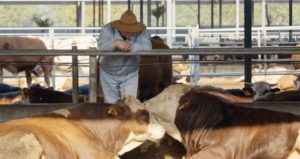Nov 9, 2022|
JD Technology Sets Mortgage Loan Example with Biological Assets as Collateral
by Doris Liu
China’s HengFeng Bank, with the assistance of the biological asset supervision platform developed by JD Technology, provided mortgage loans for 160 heads of live beef cattle, the first of such kind across the country, setting an example of digital finance nationwide, as reported by the international market research firm IDC.

According to data from the Chinese Academy of Social Sciences, the funding gap of China’s “three rural issues” – agriculture, rural areas and farmers – reached RMB 3.05 trillion yuan in 2018. However, China’s rural finance is confronted with multiple obstacles, such as insufficiency of effective credit data and lack of collateral. Financial institutions have been reluctant to accept biological assets as collateral, although they hold significant potential as collateral in rural areas, in terms of evaluation, ownership confirmation, supervision, disposal, etc.

Utilizing JD Technology’s platform, HengFeng Bank granted RMB 1.75 million yuan to Wang Yuhe, a cattle producer of Hengchang Farm in Heze, Shandong province. Connecting with camera equipment installed in the cattle ranch and smart ear tags attached to the ears of 160 cattle, the platform collects dynamic data on each head of cattle 24/7 in real time, monitoring and recording the growth information and health status throughout the life cycle of beef cattle production. Meanwhile, the data are synchronously uploaded to blockchain to ensure the uniqueness, authenticity as well as protection against being tampered with or reproduced, largely reducing the bank’s lending risks and easing Wang’s financial pressure.
Creating a digital twin on blockchain ensures that all information of a physical animal will be saved immutably, which enables biological assets to qualify as collateral. The biological asset supervision platform, integrated with AI, big data, blockchain, IoT and more technologies, has been applied in production of livestock including cattle, sheep and pigs, and poultry and fish by monitoring them with cameras, smart IoT devices of ear tags, collars and leg rings; and equipment including water quality sensors, temperature and environment control and ultrasonic instruments to match different animals’ traits.
For example, aquaculture supervision solutions based on the platform were launched in July 2022 by linking dissolved oxygen sensors, pH sensors, Oxidation-Reduction Potential (ORP) sensors and other IoT devices, underwater cameras, intelligent feeding systems and more, which will simplify the process of loan application for fish farmers and banks.
On the consumer side, JD Technology’s platform also guarantees product quality, as it supports full traceability of meat products. In some cases, the amount of walking chickens have done before butchery can be assessed with a specially designed pedometer similar to a poultry leg band, which is connected to the platform, to ensure the quality of the meat.
Farmers can more easily spot any risks to their livestock, plants and the environment with the platform. The IDC report believes that the digitalized biological asset supervision helps bring more financial support to rural areas. Apart from loans, financial institutions can lower the threshold to offer bespoke livestock insurance to mitigate the multitude of risks faced by farmers. Furthermore, governments are able to distribute subsidies to farmers more precisely through the platform, further boosting the ongoing rural revitalization.



 JDDJ and The J Shop Join Hands with HLA
JDDJ and The J Shop Join Hands with HLA



